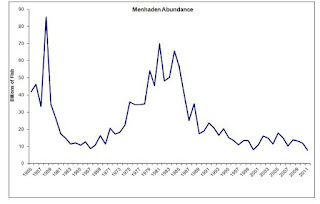Sorry for the long delay between posts. I've been so busy with work that this had to take the back seat for a spell. BUT, I've finished illustrating all (count 'em, ALL) of the ROckfishes, and having moved on to Sculpins I'm finding small windows of time to share news, resources, and personal insights... at least for now :)
Menhaden have been call "The most important fish in the sea." It might be an overstatement, but not for those living along or in the western Atlantic Ocean and Gulf of Mexico. They are small, very oily, schooling fishes that have played an important role ecologically and commercially for many many years. Innumerable sea birds, marine mammals, sharks, and other predatory fishes prey on Menhaden. Their flesh is packed with high-quality energy.
In the past 30 years, purse seiners have scooped up so much Menhaden to process into fish oil products, pellets, and fertilizer that the Menhaden stocks have literally crashed. The large, dark clouds of Menhaden schools are no longer a common sight in the Chesapeake Bay. As a result, other fish stocks, such as Striped Bass, have also declined. The ensuing debate between the fish oil companies, environmentalists, scientists, fishermen, and government about how to manage the fish stocks has been mired in grid lock. Reducing catch limits puts the fish oil companies in jeopardy. But, allowing the catches to go on at current levels ALSO puts the oil companies at jeopardy. If they were allowed to take every fish, they'd put themselves, and a multitude of other companies out of business. Oh, and never mind the top predators who feed on Menhaden but don't get a vote in the process.
I realize this is a very simplified explanation, and the issue is more complex than this space allows... Bottom line: the Atlantic States Marine Fisheries Commission today passed new regulations to cut catch of Menhaden by 20%. There are many caveats to this of course. But it is a move in the right direction and will hopefully allow Menhaden to repopulate. If they can rebound (and I think they can), businesses and marine life that depend on their presence might hopefully flourish again, too.
CLICK HERE to read more.
Cheers!


oh!beautiful fish.can i get it & how much?
ReplyDelete